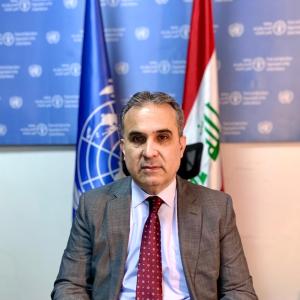FAO Iraq Delegation meets with H.E. Governor of Missan to discuss E.U. funded project in Southern Iraq
23 January 2021
23 January 2021 – Missan: Poor smallholder farmers and landless rural households in the Southern Governorates of Iraq will soon receive support to improve their agricultural productivity and livelihoods.
Dr. Salah El Hajj Hassan, FAO Representative in Iraq, accompanied by FAO delegation, met on Saturday 23 January with H.E. Mr. Ali Dawai, Governor of Missan. The meeting comes in time for the launch of FAO-EU funded project on 27 January in Basra. Dr. ElHajj Hassan presented the main components of the project and FAO plan to support local men and women farmers to establish hygienic local homestead enterprises, improve management of natural resources, increase the capacity of national institutions in the agriculture sector and strengthen target value chains of tomatoes, buffalo and dates. “It is essential for FAO to work closely and in partnership with local stakeholders and national institutions represented by the Ministry of Agriculture and the local Government in order to ensure this project goals’ are achieved.” Added Dr. ElHajj Hassan.
From his side, Mr. AlFartousi praised the efforts led by FAO in Iraq to support the agriculture sector and reduce poverty through its support to the development and sustainability of food production, he said ”We are certain that this FAO led initiative will support income generation in the Governorate and minimize poverty”. He also gave instructions to ensure coordination is in place for the effective implementation of this project.

He started his career in 1984, as Senior Research Assistant in the Agricultural Research and Education Centre (AREC), American University of Beirut. From 1987 to 1991, he was Coordinator of the Student Training Programme, and also Agriculture and Horticultural Teacher for the Faculty of Agriculture, at the Lebanese University.
From 1991 to 1995, he worked as Agricultural Engineer at the Ministry of Agriculture, Bekaa Regional Office, Zahlah and was then assigned to the Agricultural Research Institute in the Tal Amara station, first as Head of the Crop Production Department and subsequently in charge of the Plant Protection Laboratory. From 2002 to 2006, he was Director of the Kfardane Research Station (Agricultural Research Institute). In 2008, he became Visiting Scientist at the International Maize and Wheat Improvement Centre (CIMMYT) and Coordinator of a project with the International Centre for Atomic Energy Agency, Vienna.
In 2010, he served as Advisor to the Minister for Agriculture of Lebanon. In 2011, he became President of the Pesticide Scientific Committee, Head of the Phytoplasma Committee and Director of the Agriculture and Rural Development Programme (ARDP) (EU-funded project). From 2010 to 2013, he represented Lebanon in negotiations with EU, Egypt, Jordan and Iraq. During his career, Mr Hajj Hassan also carried out a number of other functions. He represented the Lebanese Agricultural Research Institute (LARI) in several research programmes with the International Centre for Agricultural Research in the Dry Areas (ICARDA) and the American University of Beirut. He was Coordinator of the Mashreq/Maghreb project with ICARDA, representing Lebanon in the Steering Committee, as well as being the Head of the Sugar-beet Delivery and of the Wheat Delivery Committees. For a number of years, Mr Hajj Hassan worked for the preparation of FAO TCP projects and served as the National Director of a TCP project. He joined FAO in January 2014 as FAO Representative in Yemen. Mr Hajj Hassan succeeds Mr El Zubi as FAO Representative in Iraq.



